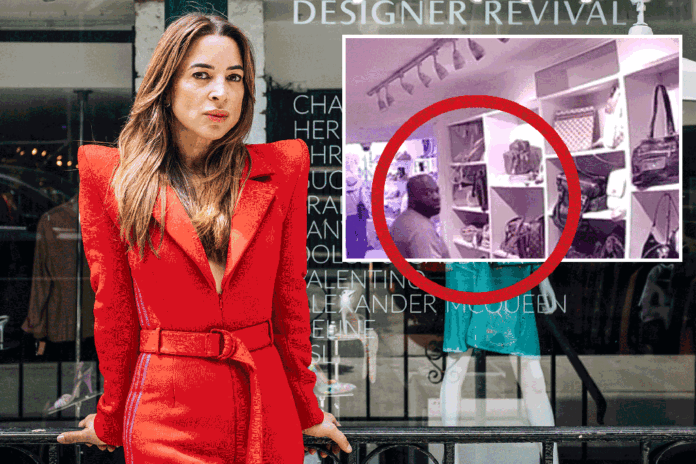As the owner of a Manhattan small business, Tiffany Keriakos realizes the city isn’t for the meek. But rampant crime, merciless hackers and a looming federal lawsuit are pushing her luxury consignment shop to the brink.
Keriakos sells preowned luxury brands like Louis Vuitton, Dolce & Gabbana and Burberry at Designer Revival on the Upper East Side.
This month a shoplifter stole three bags valued at a total value of $8,000 from the E81st Street store.
Then she was sued over a claim her website isn’t accessible to blind people – a shakedown by legal means, says Keriakos.
It is the latest in a string of thefts, credit card fraud and insurance woes since she bought the boutique in 2015.
Keriakos revealed in The Post in April last year how burglars stole more than $100,000 in merchandise from Designer Revival in the span of one month, leaving her little time to focus on growing her brand.

A month later, Keriakos detailed a March 2022 heist where three burglars used bolt cutters to get through a glass door at the store and steal designer handbags worth more than $30,000.
Now she has been struck again, this time by a brazen shoplifter on May 27.
Surveillance video shows the alleged thief scoping out the store’s chic clothing, handbags and accessories beforehand, then cutting the security cords while other shoppers are browsing.
Making matters worse, hackers also targeted Designer Revival’s Facebook account and got Keriakos’ credit card information to make $30,000 in fraudulent charges, she said.
That shoplifting came only days after she was sued by a blind man who claims her shop’s website breaches the Americans with Disabilities Act (ADA).


Vincent Clement, of Brooklyn, claims he tried to buy a $480 Ferragamo patent leather satchel for his wife, but “encountered barriers” denying him “full and equal access” to the bag.
Clement claims he couldn’t buy the upmarket bag since Keriakos’ website doesn’t have features which helps blind people who use special software to read sites’ content to them, attorney Mark Rozenberg alleges in the civil lawsuit.
Rozenberg says that he wants a court order forcing Keriakos to update her website to include blind-friendly features – something which could cost her thousands.
“Getting robbed so many times, it was such a disaster,” Keriakos, 49, told The Post. “But the frustration that I’ve had over the past few weeks has pushed me to all new levels.
“And I have to foot the bill because I have to pay the consignor – I don’t own my inventory.”


For Keriakos, who has yet to hire an attorney, the prospect of yet another existential threat to her shop is difficult to digest.
“Nothing is easy,” the exasperated owner said of being a New York City entrepreneur. “Something has to give.”
Software to fully comply with ADA regulations costs approximately $25,000 annually and the married mother of two already lost roughly $200,000 in stolen merchandise in eight years and has been dropped by two insurance companies.

The latest misfortune has left Keriakos with more questions than answers – as well as a potential change in scenery.
“As a small business, where we’re making $3 million a year, there’s nothing we can do,” she said. “Everybody just keeps taking advantage of us.”
Keriakos said she felt she was being targeted in the lawsuit over her website.
“This is happening more and more,” Keriakos said of website accessibility lawsuits. “They’re just trolling and seeking out small businesses.”
Figures show that across the country there were 3,255 website accessibility lawsuits in federal court last year, up 12% on 2021 – a “very significant” increase, according to data compiled by Chicago-based firm Seyfarth Shaw LLP.
Federal courts in New York were deluged last year with 2,560 website accessibility filings, easily the most in the nation. Florida ranked second with 310 cases, while Pennsylvania finished third at 216, data shows.
New York courts have been “more favorable” toward plaintiffs in website accessibility cases, particularly if the accused business operates solely online. In California, however, both federal and state courts have ruled companies that are exclusively online are not covered by the ADA, according to the Chicago labor and employment law firm.
But how to comply with the 1990 civil rights law barring discrimination based on disability is “not exactly clear,” attorney David Stein told The Post.
Stein, who handles web accessibility cases, does not represent Keriakos, but understands her pain. Such lawsuits are often brought by plaintiffs or attorneys who regularly seek out potential ADA violations, he said.
“The question is, you know, are these bona fide customers on the site, or are they bona fide troublemakers,” Stein said. “Most of the plaintiffs bringing these cases, it’s not their first rodeo.”

Clement, who uses screen-reading software on websites, is among more than 8.1 million visually impaired Americans, including 2 million who are blind, according to 2010 Census figures.
Rozenberg, his New Jersey-based attorney, declined to comment when reached Tuesday.
The ADA does not entitle people like Clement to cash payments if they win their cases. Instead they can get court orders forcing businesses like Keriakos’ to comply. But lawyers can also ask for cash payments to settle cases without a trial.
Keriakos said that dealing with fraud, theft and legal threats on top of the normal difficulty of onerous regulations was driving her to breaking point.
“Nothing is changing, and it’s just getting worse,” Keriakos said. “And it’s like, I want to get rid of my business. I don’t even want to be here anymore, and I’m a New Yorker. It’s, like, just impossible to survive.”


